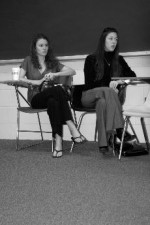Widow of local soldier stresses need for compassion

It was hours after she found out that her husband had died in Iraq and the media was assembled outside her house already jockeying for a quote or a picture.Katie Garvey and her then-roommate, Abby Robuck, sat in the first two chairs when entering Room 65 in Leavenworth where David Blow’s News Media Ethics class met. They recounted the disgust and invasion of privacy they felt when dealing with the media, hoping to spur the would-be journalists to use compassion when dealing with similar situations.
“Be respectful and compassionate,” Garvey said throughout her talk. “If you go to them in a tactful manner, I bet they’ll be willing to work with you.”
In nearby Proctor, a town with less than 2,000 residents, Justin Garvey’s 2003 death, one of the first in the Iraq war, shook the town and the entire state hard. Upon his death, the media rushed to the Garvey’s house in Kentucky, where Katie and Robuck were living at the time.
They described the behavior of the media as “ruthless.”
Three of Justin’s friends had to go hold off the media horde at the end of the driveway.
“They were ruthless, no respect at all,” Robuck said.
The next day, Garvey was contacted by Rutland Herald reporter Gordon Dritschilo, also from Proctor, who a week earlier had told Blow’s newsgathering and writing class that his story about Garvey was one of his best.
“I’m a lot more proud of the stories I wrote for that award, rather than the award itself,” Dritschilo said to Blow’s class, saying the Garvey story was one of several submitted that led to his award.
While Garvey said that the story he wrote was “not bad,” she was less than pleased with the way Dritschilo treated her.
“He was just a jerk,” Garvey said, adding that the encounter “left her with a bad taste in her mouth.”
Dritschilo declined to comment for this story.
Garvey said Dritschilo contacted her on the phone stating that he had a deadline he couldn’t miss. She told him she was willing to do a sit-down interview a few days later once she flew to Vermont, but Dritschilo used her comments that night for his article the next day, although she was unaware that he was taking notes during this call.
After that incident, no one got a sit-down interview with Garvey.
Eventually, Garvey said she wrote a statement that her father then gave to the media “so they’d leave me alone.”
Since then, she has decided not to grant any media requests, though she’s had plenty of opportunities to do so.
“Anyone who knows him (Justin) knows him, if not they don’t need to,” Garvey said of her outlook at that time.
Garvey said she was disgusted also how the media was willing to get a quote from anyone – like the neighbors two doors down whom she waved to once in a while, but had never talked to.
Although Garvey was scarred by the media treatment, her mother-in-law sat down with a reporter and had a positive experience.
And recently, she agreed to be interviewed by students from Norwich who were profiling different soldiers from around Vermont. Again she was happy with the outcome.
But Justin’s father took a gamble with the media, and it too turned sour. Garvey said an author writing a book about soldiers included Justin’s story, but Justin was referred to as “Jason” and his birthday was wrong.
Katie was not impressed.
To conclude the class, Garvey stressed the importance of not “[getting] in their face the day it happens.”
In order to get a true picture of the deceased from the family, the duo emphasized that reporters need to wait a couple of days and give the family time to heal a little.
“You can’t put a time limit on when you’re ready to talk about it,” Robuck stated. “Put yourself in her shoes or any of her family’s shoes.





